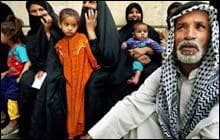Advertisement
Looming Humanitarian Crisis
Resume Before the U.S.-led attack in Iraq started, 16 million Iraqis depended on U.N.'s "Food for Oil" program for food, medicine, and water. Almost three weeks since the war started, electrical and water treatment facilities have been hit, fuel is short, hospitals are overwhelmed, while looting and lawlessness on the streets is becoming an increasing problem.
Before the U.S.-led attack in Iraq started, 16 million Iraqis depended on U.N.'s "Food for Oil" program for food, medicine, and water. Almost three weeks since the war started, electrical and water treatment facilities have been hit, fuel is short, hospitals are overwhelmed, while looting and lawlessness on the streets is becoming an increasing problem.Ken Bacon, President of Refugees International, says that contrary to the military plans, plans for post-war humanitarian aid in Iraq are in disarray and were not carefully and clearly designed before the war started.
Raymond Offenheiser, President of Oxfam America, says that the military troops are not equipped and should not be involved with humanitarian relief efforts. Instead, international aid agencies and NGOs should be neutrally and impartially involved with handling and directing humanitarian aid efforts in Iraq now and after the war ends.
Click the "Listen" link to hear about the challenges that lie ahead for humanitarian relief efforts in Iraq and who should be in charge of these efforts.
Guests:
Ken Bacon, President of Refugees International
Raymond Offenheiser, President of Oxfam America
Monte Reel, correspondent for the Washington Post, embedded with the Army's 82nd Airborne Division
Carol Bellamy, Executive Director of UNICEF
Jack Beatty, On Point news analyst and senior editor at The Atlantic Monthly.
This program aired on April 7, 2003.